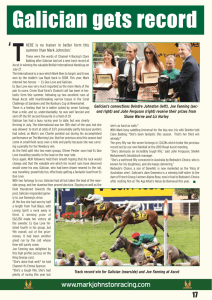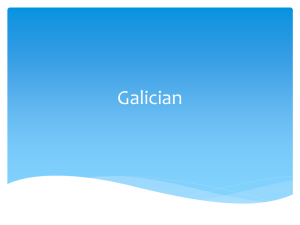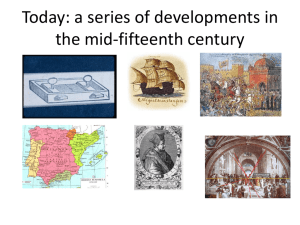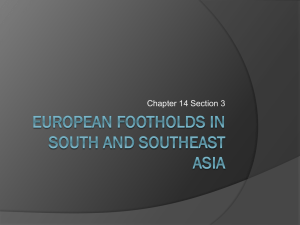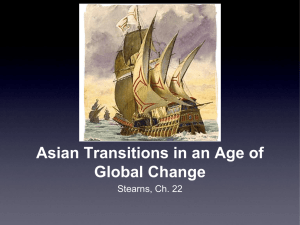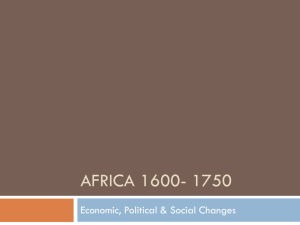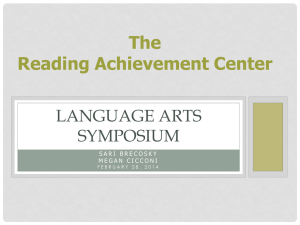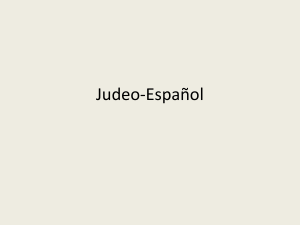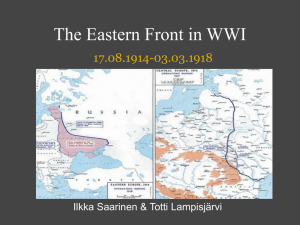GALLEGO (Galician)
advertisement
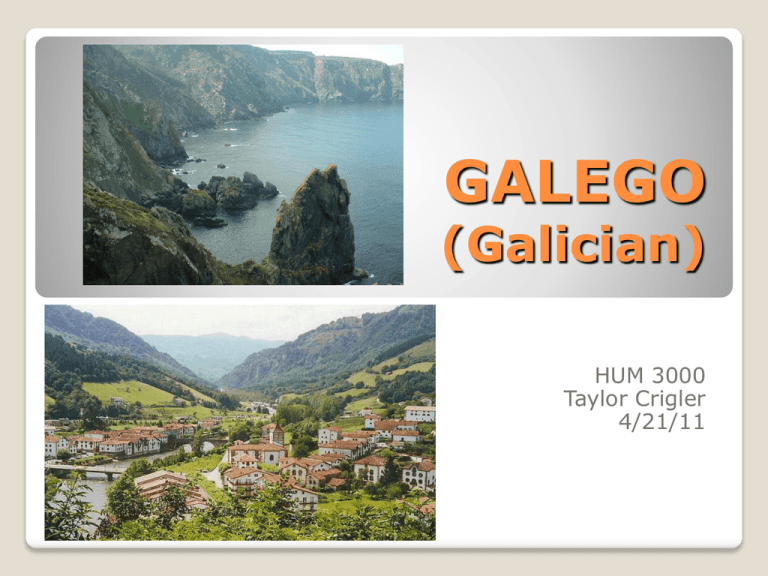
GALEGO (Galician) HUM 3000 Taylor Crigler 4/21/11 Galician is spoken primarily in the region of Galicia in northwest Spain, and also the surrounding borders of Portugal, Asturias, and Castile and León. Galicia Galician came from Galician-Portuguese (also known as Old Portuguese), a Western-Iberian language. There is some controversy whether gallego is a Portuguese dialect or a separate language. Galician is an official language of Spain. Derivation from Latin: Galician is spoken by about 3 million people, mainly in Galicia (population approx. 2.78 million, about 6.13% of Spain’s population). Largest cities: Vigogreater area 660,000 A Coruña-Ferrolgreater area 600,000 Who speaks Galician? The primary language spoken in the larger cities is Castilian, whereas Galician is the primary language in rural areas. Vigo Where is Galician spoken? Galicia is a mountainous and coastal region and has so many small bodies of water that it is also known as “the land of a thousand rivers.” About Galicia: During Roman rule, it is said that Galicia was “less Romanticized” than other regions in Spain. Galicia became an official region 3 times (in the 10th, 11th, and 12th centuries). Galician was always the spoken language by the majority and actually had a dual status with Latin for formal settings. Linguistic History: 1892- Franco was born in Galicia; as the dictator of Spain until 1975, Franco actually discouraged the recognition and promotion of the Galician language. 1906- the Royal Galician Academy was founded May 17- Día das Letras Galegas (Galician Literature Day)- devoted to a different Galician writer every year Linguistic History: Most Galicians are proud of their language and fight to preserve it and recognize its distinction. As an official language, it is protected and taught along with Castilian in primary education, and Galician universities are largely conducted in Galician. On the other hand, some recognize the situation in urban areas as a diglossia. Linguistic Status: mixed reviews http://www6.gencat.cat/llengcat/noves/h m02hivern/internacional/a_galego1_4.ht m [Draft of measures to improve attitudes towards the Galician language and the extension of its use, by the Research team of the Seminar of Sociolinguistics of the Real Academia Galega] Protecting Galician: Galician literature has a restless history emerging in the Middle Ages, suppressed during the Dark Ages and Franco’s dictatorship, and now has been revived once again. Notable authors: Ramón del Valle-Inclán (Generation of 98) Rosalia de Castro Literature: Manu Chao- Bixo http://www.youtube.com/watch?v=ko_cJIe EUAA YouTube - MANU CHAO – BIXO Music: Portugués Galego Portugués Galego Um Uno Onze Once Dois Dous Doze Doce Três Tres Treze Trece Quatro Catro Quatorze Catorce Cinco Cinco Quinze Quince Seis Seis Dezesseis Dezaseis Sete Sete Dezessete Dezasete Oito Oito Dezoito Dezaoito Nove Nove Dezenove Dezanove Dez Dez Vinte Vinte 1-20 Portuguese z Galician c Portuguese qu Galician c Deletion of geminate consonant Some vowel changes Portugués Galego Trinta Trinta Quarenta Corenta Cinqüenta Cincuenta Sessenta Sesenta Setenta Setenta Oitenta Oitenta Noventa Noventa Cem Cen 20-100 Portugués Galego Portugués Galego Janeiro Xaneiro Julho Xullo Fevereiro Febreiro Agosto Agosto Março Marzo Setembro Setembro Abril Abril Novembro Novembro Maio Maio Dezembro Decembro Junho Xuño Notes: Galician preference to spell with x instead of the Portuguese j Difference in palatals- Portuguese: nh and lh; Galician: ñ and ll Months http://www.academiagalega.org/ Independent organization devoted to preserving Galician and amicably integrating it with Portuguese http://www.agal-gz.org/index.php All Galician news: “A nossa língua na rede, a nossa língua no mundo” [Our language network, our language in the world] http://www.amesanl.org/index.asp “Sole objective: the promotion of the use of Galician in all spheres of social life.” (in Galician, English, and French) Sitios en galego: http://bvg.udc.es/ ”Virtual Galician library,” provides access to Galician texts http://www.consellodacultura.org/arquivos/cdsg/lo ia/ History of the language and grammar tutorials (available in Galician, Castilian, and English) http://www.crtvg.es/reproductor/inicio.asp?canal= radio&arquivo=0 Galician radio and television! Sitios en galego: http://www.europapress.es/galego/ National and international news in Galician http://www.galego.org/ Galician website that provides language history and opinions on current issues (available in English) http://ilg.usc.es/ Galician Language Institute http://www.vieiros.com/ Online Galician newspaper Sitios en galego:
